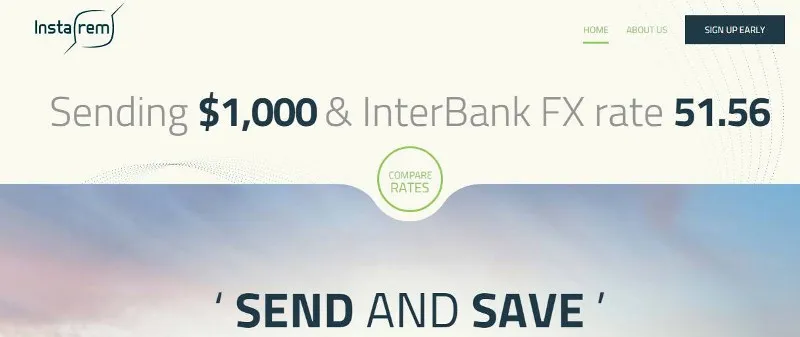Cross border money transfer startup InstaRem launches its services
InstaRem, a remittance payment startup, is getting into international money transfers, and significantly undercutting the competition on price and speed. It’s probably time to kiss The Western Union and Money Gram goodbye. Cross border money transfer is traditionally designed to fleece money from senders and receivers; hence, many startups are trying to disrupt the space. So the remittance market is now witnessing immense action from upcoming startups.

Team
Prajit Nanu is the Co-founder and CEO of InstaRem. Based in Mumbai, he’s responsible for executing the business strategy and directing the overall performance and growth of the organisation. Michael Bermingham is co-founder and COO. He oversees Instarem's core operations and compliance globally. His key responsibilities are global expansion of the firm, working with local regulators in each jurisdictionand building teams and offices in local markets.
What does InstaRem do?
InstaRem is a startup that inexpensivelycarriescross-border money transfer, mainly, inAsia. Prajit says, “Our focus is twofold: Retailing for peer-to-peer consumers (XYZ person sending money from India to somebody inThailand/Singapore/ Australia)and Freelancers, i.e.,those who receive money from abroad to India for freelance services they provide. For instance, PayPal has a straightforward fee structure: they charge at 4.5 per centalong with an FX conversion fee. The way we differentiated was we don’t make a significant cut. We take 1 per cent as a fee only.”
He adds, “What we’re charging users for is only to cover the intra-day FX fluctuation. And we charge flat 1 per cent fee in comparison to a bank that charges flat $22 fee plus the FX trade.
“We’re licensed to operate in the space. Incorporated in Australia, InstaRem PTUI Limitedwas licensed by Australian Securities Committee in November 2014. We transfer funds from Australia to India.
“We did research on how to be competent on price front. Lots of Indians have a fascination with sending money through Indian banks. We took four or five key Forex players, which are largely bank-owned companies. We also took The Western Union. As per our analysis, we were 77per cent cheaper across the board and, that is the value we’re bringing to retail customers.”
Dealing with KYC at InstaRem
InstaRem uses a system they call InstaPic to ease the process of document submission. Instead of trying to scan and upload, InstaPic lets users to click a picture with the webcam of their laptop. Once the data is collected, it pushes itto the GlobalDataCompany API for authentication. Prajit says,“It’s the most accurate database across the globe. Once your data is verified instantly, the customer doesn’t have to wait 24-48 hours for verification. If GDC boots him/her out, we’ll reach out to them tomanually verify and make the registration happen. But our understanding is that GDC will cover all the required KYC norms. Our partnership with GDC is not just for Australia, but across the globe. We’re integrated at the API level .”
The KYC is compulsory for the person sending the money. InstaRem,is an account -to-account money transfer startup. What that means is they take money from a sender’s bank account in the home country and transfer it to the recipient’s account in the destination country. This eases the burden of KYC. Prajit says, “We don’t deal with any cash. The challenge with cash is:One,it’snot growing, and theotheris that it’snot traceable. A research report recently claimed cash was growing at 4 per cent year-on-year, and electronic,at 28percent year-on-year. Our focus is to do account-to-account fund transfers. We’ve tried to simplify money transfer to ‘1,2,3 steps’ to the customers.”
Technology and team
The overall team strength of InstaRem is seven members, out of which five are in the tech team. “We are on a .Net technology stack and SQL database. W’re using SoftLayer as our hosting service provider. Their customer support is awesome; especially, their Asia Pacific support team has been fantastic to us. We’dtaken a call to move to SoftLayer in December- we’ve been happy ever since,” says Prajit.
We asked Prajit his thoughts on bitcoin andhe asserts that InstaRem will embrace the technology when it needs to. In the visible futurefive-to-six years from now,he doesn’t see the Indian government adopting it at the speed people would want.
On liquidity
Prajit says, “Liquidity is part of our secret sauce. We’ve got banking partners in 17 banks with Nostro accounts.” Naturally, we can’t reveal everything we’ve discussed with Prajit off-the-record, butwe’d say their strategy and model looks quite scalable.
Right now, they’re testing waters with transfers between India and Australia. We asked him if 1 per centwas enough markups? He replies, “It’s a volume game.” Their goal currently is to be one of the faster companies to send one billion dollars.On an average, companies take up to four years to reach that figure. The aim they’ve set for themselves is to reach that number in two-and-a-half years.
The next game
What InstaRem does have is lots of up-selling opportunity,afteracquiring users for remittance:
Travel Money:People often use their credit card, whichattracts a 3.5 per cent transaction fee.
Students Market:This is another market for them as students from India and China study every year, and they use banks as a medium to transfer money.
Website: instarem.com







